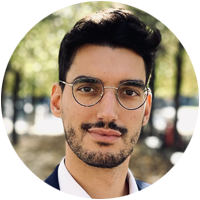
As an eye surgeon at the Institut Daviel Ophtalmologie in Paris, France, Hugo Lama, PhD, specializes in refractive surgery and corneal transplants. With a focus on improving patients' quality of life, Hugo enrolled in AI in Health Care: From Strategies to Implementation program to deepen his understanding of artificial intelligence applications within clinical practice. His experience not only expanded his knowledge but inspired him to launch a startup integrating AI and patient care.
What led you to this current role/profession?
My passion for advanced medical technologies, such as lasers, combined with my deep commitment to improving patients' quality of life through improved vision, led me to specialize in eye surgery. In particular, the precision, innovation, and transformative outcomes associated with refractive surgery have driven my professional focus.
What were you hoping to gain from the AI for Health Care: Strategies and Implementation executive program?
Artificial intelligence is starting to become a part of our daily lives in ophthalmology and other specialties. However, many doctors don't understand or embrace it enough, despite all the benefit it brings. In the end, I chose the AI in Health Care: From Strategies to Implementation program based on its curriculum, perfectly adapted to my interests as a practitioner in the health care industry, and [Harvard Medical School’s] great reputation.
How was your experience during the program? What did you find most useful or interesting?
My experience during the program was exceptional. The most insightful aspect was gaining practical knowledge on integrating AI-driven technologies into clinical workflows and decision-making processes. Real-world case studies and expert interactions provided valuable insights that bridged theoretical knowledge and practical applications effectively.
Are there any learnings from the program that you’ve applied to your work?
Yes, I founded a start-up based on my capstone project, an AI-powered solution for the automated prescription of glasses. With the help of an ML engineer, we've already started to develop an AI model which shows very encouraging initial results.
Would you recommend this program to other health care professionals? If so, why?
Absolutely. This program clearly explains how health care professionals can effectively and safely use AI in their work. The content is easy to follow, highly practical, and offers direct interaction with experts. It is extremely helpful for anyone who wants to improve patient care using innovative approaches.